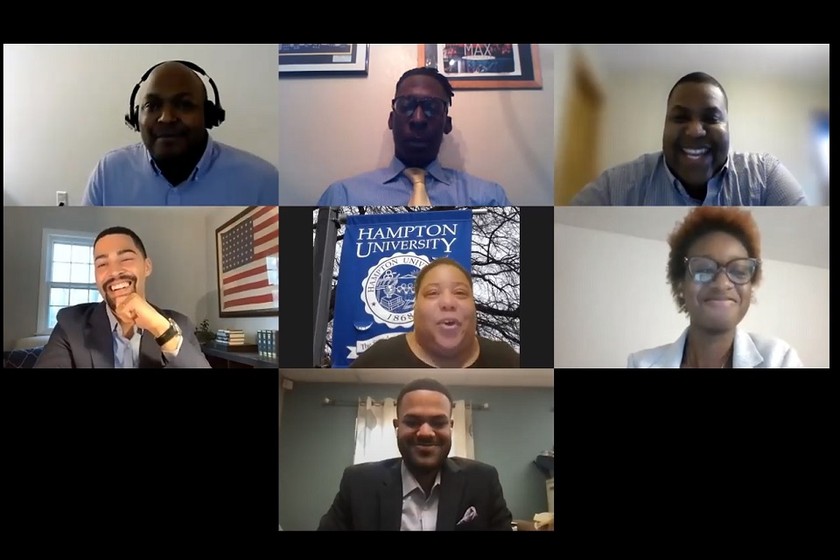
The Center for Career Development recently hosted a panel featuring 6 Black professionals discussing the benefits of having mentors. Among its participants were Brittany Yancy—an Assistant Professor of Humanities at Goodwin University, Harry Amadasun Jr.—an Underwriting Operations employee at Travelers, Taniqua Huguley—Director of Economic Mobility Initiatives at United Way, Matthew Rivera—Executive Director of The Dream Support Network, Erick Russell—Partner at Pullman & Comley, LLC, and Aaron Knight—a Grants and Contracts Specialist at Connecticut Department of Public Health. All 6 professionals touched on similar themes: there are different types of mentors, the importance of having a mentor who shares the same identity as you—but also being open to mentors who do not, conquering imposter syndrome, and building a support network.
For Brittany, her history professor—another Black woman, helped her see “something that I didn’t see in myself . . . she said ‘You have a critical analysis. You have a voice that is asking more critical questions.’” That professor’s encouragement inspired Brittany to pursue a career in higher education herself. Harry, as the son of Nigerian immigrants, drove home how important it is for foreign students of color to find mentors early on to help them acclimate to the U.S. educational and employment systems. “Getting a mentor, especially early on . . . is super important to just give you a central focus to bounce ideas back on and have someone there to let you know if you’re heading in the right direction.” It’s also important to recognize different types of mentors, as Taniqua showed. “I had my academic mentors—Dr. Johnny Williams, a Black man from Arkansas, a peer mentor to really help me navigate that student life at Trinity . . . and really just seeking other Black women on campus.” Mentors can also take the shape of parents, as Aaron shows. “Seeing my parents navigate work in a public sector or non-profit space environment and having them be able to help guide me on what I need to do for classes or what my career options might be was beneficial.”
When it comes to conquering imposter syndrome, Erick shared that “like everybody else at times, I’ve struggled with imposter syndrome.” He continues that the key is “making sure that you have mentors who you identify with however that looks like . . . to just affirm that it’s okay to shine in your own way.” Matthew adds that it’s important to “gauge and understand what capacity can your mentor serve in that role. I have mentors that I can call every day. I have other mentors where I have to come to them with a concise agenda and show them exactly how I fit.” Thus, what’s particularly important for conquering imposter syndrome is, again, recognizing the different types of mentors available. Harry stresses that it’s just how America is that many higher education institutes and workplaces are predominantly white, so he advises students of color to find mentors beyond those traditional places, too. “Also being open and willing to find a mentor outside of your industry, race, or gender” is important in having a diverse network, Taniqua notes.
The full conversation is available on our YouTube channel. Click the play button above to check it out!
